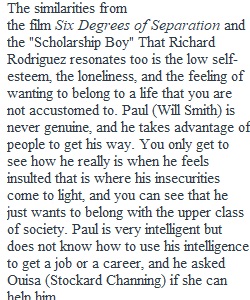


Q The Assignment: The task is a simple one, but these are the hardest, often, because the nuance inherent in the assignment is, well, nuanced. First, though, you'll want to review Richard Rodriguez's "The Achievement of Desire," with the intent of coming to terms with his thoughts and ideas regarding the "scholarship boy." As documented by Rodriguez, the term is borrowed from another writer, Richard Hoggart, a writer he quotes often in his chapter excerpt. However, the definition of Hoggart's scholarship boy (working-class, England born, academically ambitious yet intellectually mediocre) is expanded by Rodriguez to include issues of race and ethnicity, and language). In short, Rodriguez describes that Hoggart's scholarship boy suffers much as he assimilates into a world different from his own; however, Rodriguez's scholarship boy-type journey is even harder than Hoggart described because Rodriguez's race and ethnicity separated him from the mainstream, and the duality of his Spanish speaking home and English speaking academic life only further complicated the assimilation process. Given the above, you're asked to apply Richard Rodriguez's definition of the scholarship boy, as best you understand it, to the film, Six Degrees of Separation. In direct terms, critique one relevant example of Paul as the "scholarship boy," while referencing your connection back to any of these subjects that pertain to the next essay prompt (ethnicity, culture, race; language, assimilation, social class). The 411: 1. The deadline for your initial post (250 words) and TWO reply posts (100 words each) is fast approaching. So make note of the deadline specifics. 2. The points for this assignment will go into the "pre-writing assignments" column, so they carry a significant weight. Partial posts, or posts not meeting the word count, will guarantee you, at most, only partial credit. Other: Continue to keep it classy, ladies and gentleman. As a group, you were impressive with the first discussion board round: cogent thoughts, well-explained commentary, and no text-scribble as far as the proverbial eye could see. So keep it up. Good things come to those who write "good" . . . er . . . write "well."
View Related Questions